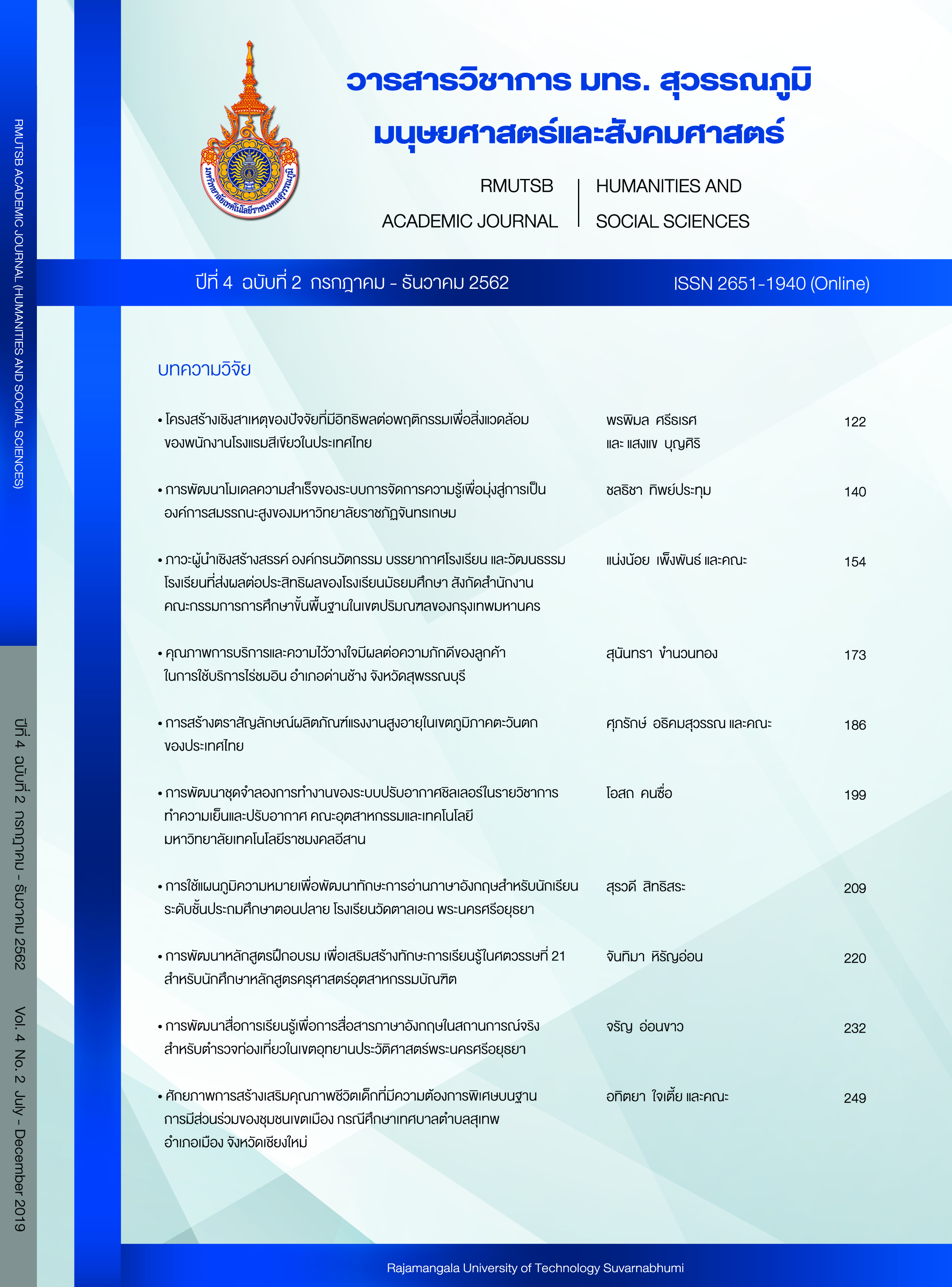การพัฒนาหลักสูตรฝึกอบรม เพื่อเสริมสร้างทักษะการเรียนรู้ในศตวรรษที่ 21 สำหรับนักศึกษาหลักสูตรครุศาสตร์อุตสาหกรรมบัณฑิต
Main Article Content
บทคัดย่อ
การวิจัยนี้มีวัตถุประสงค์เพื่อพัฒนาหลักสูตรฝึกอบรม เพื่อเสริมสร้างทักษะการเรียนรู้ในศตวรรษที่ 21 และประเมินประสิทธิผลของหลักสูตรฝึกอบรม เพื่อเสริมสร้างทักษะการเรียนรู้ในศตวรรษที่ 21 สำหรับนักศึกษาหลักสูตรครุศาสตร์อุตสาหกรรมบัณฑิต กลุ่มตัวอย่างที่ใช้ในการวิจัยเป็นนักศึกษาสาขาวิชาวิศวกรรมอิเล็กทรอนิกส์และโทรคมนาคม ชั้นปีที่ 3 ภาคเรียนที่ 2 ปีการศึกษา 2561 จำนวน 15 คน โดยวิธีการเลือกแบบเจาะจง (purposive sampling) เครื่องมือมือที่ใช้ในการวิจัย ได้แก่ 1) หลักสูตรฝึกอบรม เพื่อเสริมสร้างทักษะการเรียนรู้ในศตวรรษที่ 21 2) แบบทดสอบวัดความรู้เกี่ยวกับทักษะการเรียนรู้ในศตวรรษที่ 21 3) แบบประเมินทักษะการเรียนรู้ในศตวรรษที่ 21 และ 4) แบบประเมินความพึงพอใจของนักศึกษาที่มีต่อหลักสูตรฝึกอบรม การวิเคราะห์ข้อมูลโดยการหาค่าเฉลี่ย ค่าเบี่ยงเบนมาตรฐาน ค่าทีแบบไม่อิสระและการวิเคราะห์เนื้อหา ผลการวิจัยพบว่า 1) การพัฒนาหลักสูตรฝึกอบรม เพื่อเสริมสร้างทักษะการเรียนรู้ในศตวรรษที่ 21 มีความเหมาะสมและสอดคล้องอยู่ในระดับมาก ซึ่งประกอบด้วย 7 องค์ประกอบหลัก ได้แก่ หลักการ จุดมุ่งหมาย เนื้อหาและโครงสร้างหลักสูตร ระยะเวลา กิจกรรมการฝึกอบรม สื่อประกอบการฝึกอบรมและการวัดและประเมินผล 2) ผลการประเมินประสิทธิผลของหลักสูตรฝึกอบรม พบว่า 1) ความรู้เกี่ยวกับทักษะการเรียนรู้ในศตวรรษที่ 21 หลังฝึกอบรมสูงกว่าก่อนฝึกอบรม อย่างมีนัยสำคัญทางสถิติที่ระดับ 0.05 2) ทักษะการเรียนรู้ในศตวรรษที่ 21 อยู่ในระดับมาก และ 3) ความพึงพอใจของนักศึกษาที่มีต่อหลักสูตรฝึกอบรมอยู่ในระดับมากที่สุด
Article Details
เอกสารอ้างอิง
Kay, K. (2010). 21th century skills: Why they matter, what they are, and how we get there. In J. Bellanca, & R. Brandt (Eds.), 21st century skills: rethinking how students learn. Bloomington, IN: Solution Tree Press.
Khaemmanee, T. (2013). Pedagogical: knowledge in order to provide an effective learning process (7th ed). Bangkok: Chulalongkorn University press. (in Thai)
Laohanun, S. (2008). Team building (4th ed.). Bangkok: Handmade Stickers & Design.
Martin, J. (2010). The meaning of the 21th century. Bangkok: L.T.P.
Nanthasri, W. (2016). The development of characteristics of 21th century professional teachers. Nakhon Phanom University Journal, 6(3), 96-105. (in Thai)
Panich, V. (2012). Create a trajectory of learning for alumni in 21th Century. Bangkok: Published by Nihon thasot SIdata – Sarit. (in Thai)
Phonyiam, P. (2017). The development of teamwork skills using jigsaw ll learning management with on social media for students Mathayomsuksa v. In The 2rd graduate research conference (pp.102). Maha Sarakham: Rajabhat Maha Sarakham University. (in Thai)
Seemakam, K. (2019). The development of training curriculum for strengthen on the mathematical creativity for Prathom Suksa 5 Student under Sakon Nakhon Primaey Eucational Service Area Office 3. VRU Research and Development Journal, 14(1), 161-173. (in Thai)
Sarrattana, V. (2013). A new paradigm of education: a case of homosexuality the 21th century education. Bangkok: Thipwisut. (in Thai)
Taba, H. (1962). Curriculum development: Theory and practice. New York: Harcourt, Brace & World.
Trilling, B., & Fadel, C. (2009). 21th century skills: learning for life in our times. San Francisco, CA: John Wiley & Sons.
Wongdaeng S. (2018). The development of a training curriculum to enhance the 21st century learning skills for teacher student in Rattanakosin Rajabhat University. Social Sciences Research and Academic Journal, 13(37), 75-90. (in Thai)
Wongkitrungrueng V. (2013). The 21th stcentury skills: Rethinking how students learn. Bangkok: Solution Tree Press. (in Thai)


